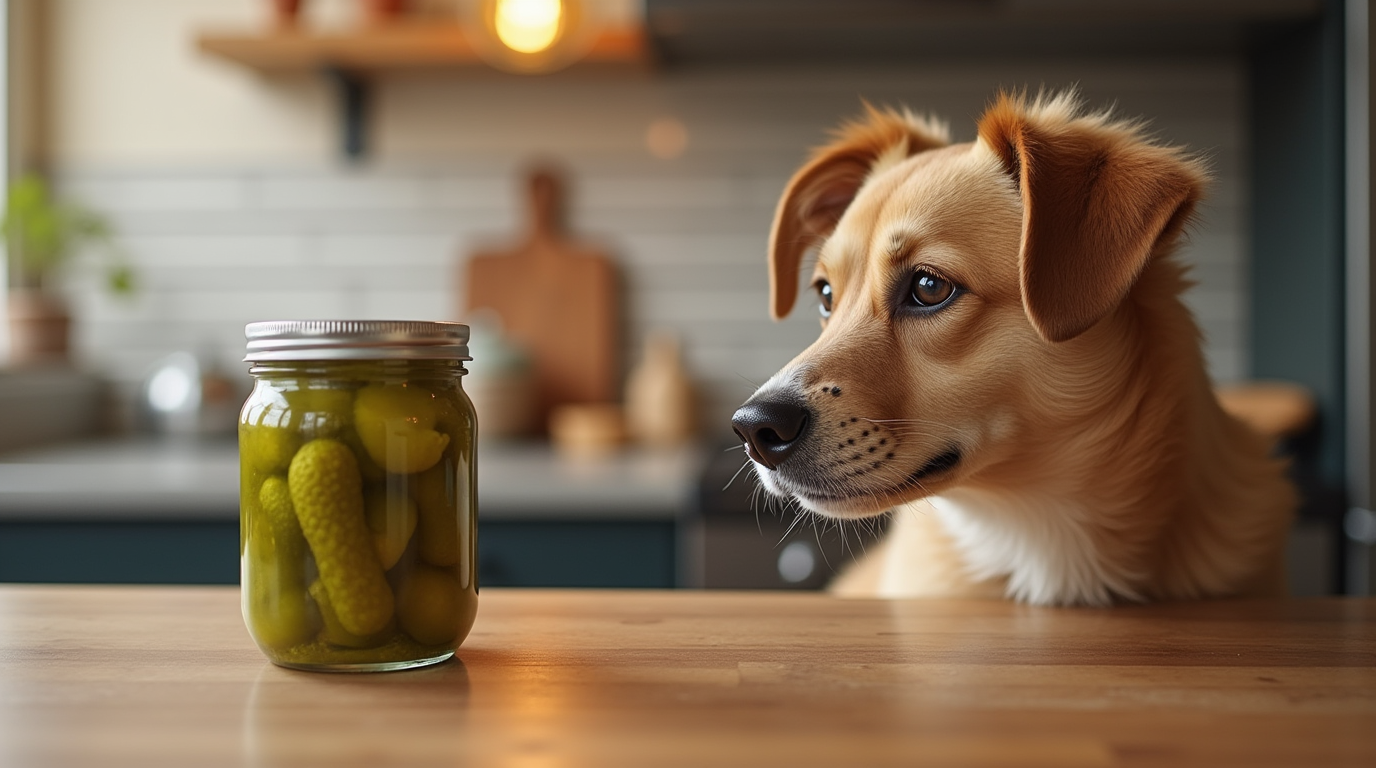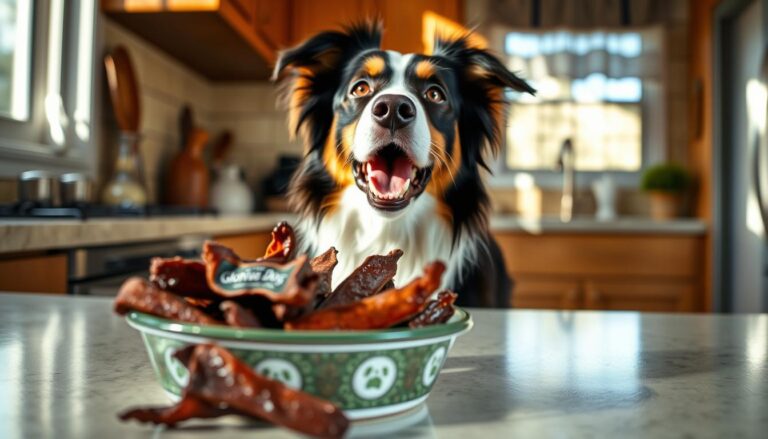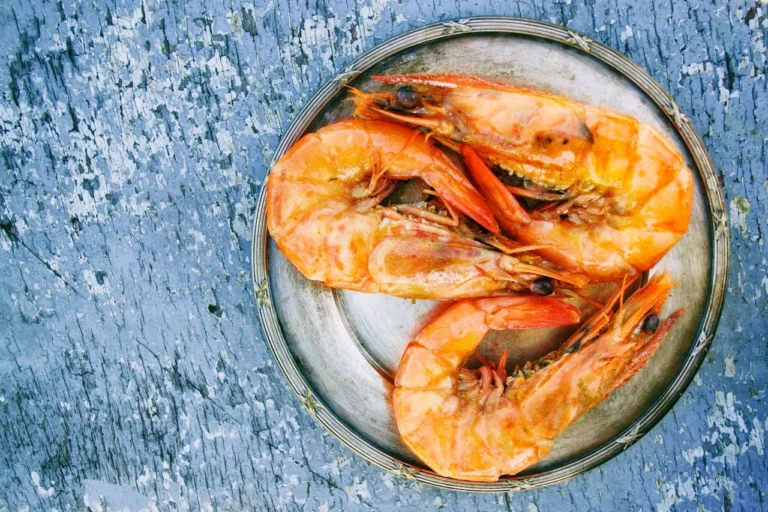Can Dogs Have Pickles? Safety, Risks, and Healthier Alternatives
Your dog stands beside you at the table while you enjoy a crunchy pickle and he gives you those soft-eyed requests for a taste. The desire to give your dog a small pickle bite must be strong at that moment. The small bite of pickle appears harmless based on first glance.
Every dog parent wishes to provide the highest standard of care for their canine companion. Dogs might interpret food sharing as an act of love yet many human foods remain unsafe for them to consume. The safety status of pickles for your pet remains unclear although certain human food items can become suitable meals for dogs.
The article provides a detailed explanation about dog consumption of pickles together with the concealed health risks associated with this snack along with alternative nutritious options for canine satisfaction.
Table of Contents
Can dogs have pickles? A Quick Answer
Dogs have the ability to consume pickles yet they should avoid doing so.
Cucumbers eaten raw provide dogs with a refreshing snack but after pickling starts the risks of harm increase dramatically. The combination of salt and vinegar and pickling spices in this process leads to various health risks between simple digestive discomfort and severe toxic effects.
Small amounts of plain dill pickles present no serious health risks to dogs. The consumption of flavored spicy and sweet pickles represents severe dangers to dogs.
Deciding to feed your dog pickle pieces should be carefully considered before making any decision.
Understanding the Pickling Process (And Why It Matters)
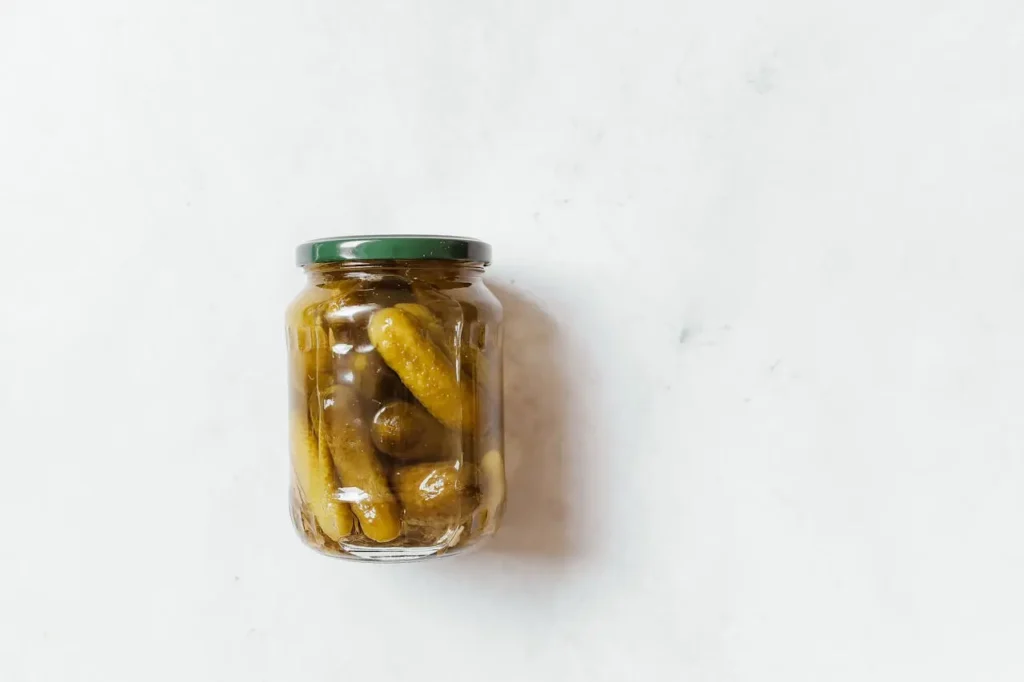
The process of making pickles requires understanding because it creates hazardous substances for dogs. Dogs experience various health effects when you transform regular cucumbers into tangy pickles through specific ingredients.
How Are Pickles Made?
The brine solution for pickling cucumbers contains three main elements:
- Salt: Used to preserve the cucumber and add flavor.
- Vinegar: Gives pickles their distinct tangy taste.
- Spices & Herbs: Often includes garlic, dill, mustard seeds, and more.
- Sugar: Common in sweet pickles.
- Artificial Preservatives: Used to extend shelf life.
Your dog’s pickle consumption extends beyond a simple cucumber because they consume each ingredient present in the pickle. Each harmful ingredient goes into the body of your pet when they consume the pickles.
Why Pickles Are Risky for Dogs
1. High Salt Content: A Silent Threat
Pickles contain excessive sodium which makes them dangerous for consumption. Dogs require much smaller sodium amounts than humans do and therefore exhibit enhanced sensitivity to salt. Consuming high sodium levels in pickles presents major health dangers to dogs.
How Much Salt Is Too Much for Dogs?
A medium-sized dog which weighs approximately 33 pounds requires 0.2 grams of sodium per day according to veterinary recommendations. One average pickle contains 800 mg of sodium which surpasses the recommended daily amount for dogs.
Excessive salt can lead to:
- The excess sodium intake in dogs triggers an increased water consumption without eliminating their thirst sensation.
- Sodium Ion Poisoning stands as a deadly condition which results in organ failure and seizures leading to death in severe cases.
Your dog remains at risk from consuming any amount of pickle even if they only eat a small portion since additional consumption of salt-containing foods makes them more vulnerable to harm.
👉 Signs of Salt Poisoning in Dogs:
- Vomiting and diarrhea
- Lethargy and weakness
- Seizures
- Muscle tremors
- Increased thirst and urination
If your dog consumes a large amount of salt or shows these symptoms, seek veterinary care immediately.
2. Vinegar: Harsh on a Dog’s Stomach
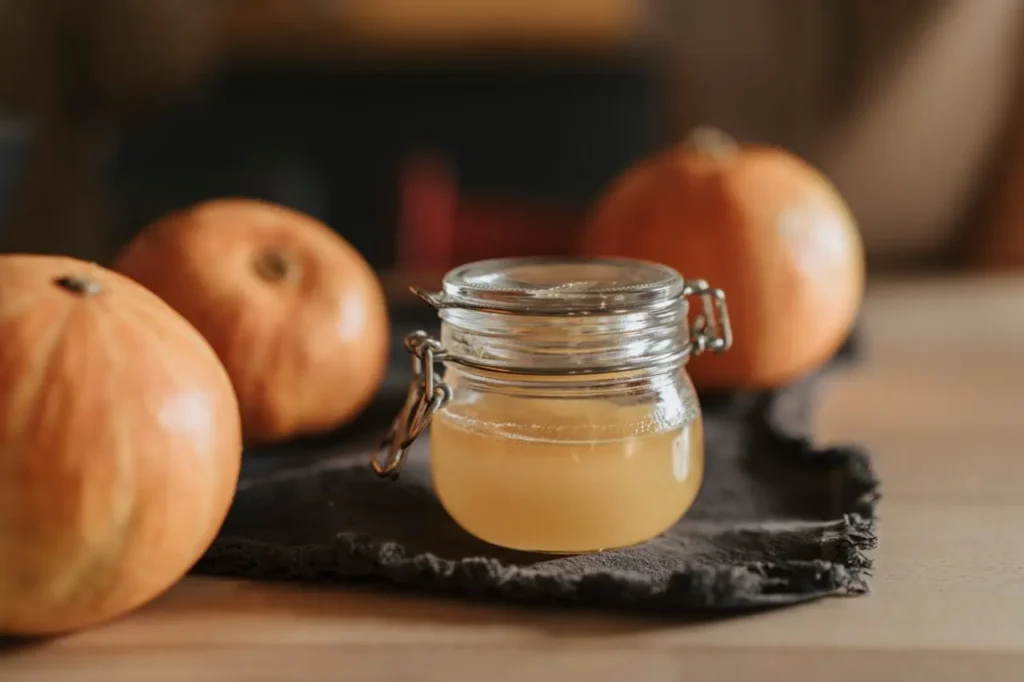
A small amount of vinegar is safe for human consumption yet its acidic properties cause discomfort in dogs by irritating their digestive tract.
Why Does Vinegar Cause Problems for Dogs?
A dog’s stomach together with digestive system remains much more delicate than what humans possess. The consumption of vinegar by dogs leads to stomach lining discomfort which produces upset stomachs accompanied by nausea.
Potential Risks of Vinegar:
- Gastritis: Inflammation of the stomach lining.
- Indigestion: Causes discomfort and bloating.
- Acid Reflux: Can lead to vomiting and nausea.
- Stomach Ulcers: Long-term exposure to acidic foods can result in ulcers.
Symptoms of Vinegar-Induced Stomach Issues:
- Nausea and drooling
- Loss of appetite
- Vomiting
- Diarrhea
Your dog should not consume vinegar from pickles on a regular basis because the substance is not lethal at small doses but it remains unadvisable.
3. Garlic and Onion: Dangerous and Potentially Fatal
The biggest threat to dogs from eating pickles stems from the possibility of garlic and onion found in their ingredients. The two ingredients that makers add to enhance pickle flavor represent harmful substances that can affect dogs’ health.
Why Are Garlic and Onion Toxic to Dogs?
The compounds thiosulfates exist naturally in garlic and onion. The presence of thiosulfates in a dog’s bloodstream leads to a condition called hemolytic anemia that destroys red blood cells too quickly for their replacement. The destruction of red blood cells by thiosulfates in garlic and onion leads to decreased oxygen transport capability that can be deadly for dogs.
Symptoms of Garlic/Onion Toxicity:
- Lethargy and weakness
- Vomiting or diarrhea
- Pale gums and tongue
- Rapid heart rate
- Abdominal pain
Dogs will suffer serious health problems from eating even tiny portions of garlic or onion in pickles because the risks accumulate throughout multiple servings.
4. Spices and Additives: Unpredictable Risks
The preparation of pickles usually contains mustard seeds together with dill and chili flakes as flavoring elements. Spices that augment human enjoyment of food create stomach irritation in dogs that leads to various digestive issues.
- Mustard Seeds: Can irritate the stomach lining and cause digestive upset.
- Chili Flakes: Spicy foods can cause burning sensations and gastrointestinal distress.
- Artificial Additives: Preservatives and artificial colorants are often added to commercially made pickles. These ingredients are not suitable for dogs and may cause allergic reactions or long-term health issues.
The unique mixture of spices found in pickles results in the following consequences:
- Upset stomach
- Gas and bloating
- Vomiting and diarrhea
Dogs should only receive treats that are manufactured for dogs because such products contain no dangerous spices or additives.
Types of Pickles: Which Ones Are Worse?
When it comes to pickles you cannot treat them as identical. The various types of pickles have different hazards for dogs. A detailed list follows regarding popular pickle varieties together with their risk level for dogs.
| Type of Pickle | Is It Safe? | Main Concern |
| Dill Pickles (Plain) | ❌ Not Recommended | High salt content |
| Bread and Butter Pickles | ❌ Unsafe | Contains sugar and spices |
| Spicy Pickles | ❌ Dangerous | Contains irritating spices |
| Sweet Pickles | ❌ Unsafe | High sugar and artificial sweeteners |
| Homemade (No Salt/Spices) | ✅ Limited Amount | Ensure no harmful ingredients |
Small amounts of homemade pickles without salt, sugar or spices may present less danger to pets however pet owners should verify all ingredients to detect dangerous additives.
What Happens If Your Dog Eats a Pickle?
A pickle consumption accident by your dog requires immediate action but you should stay calm.
What To Do After Your Dog Eats a Pickle:
- Examine the ingredients to verify the presence of garlic and onion together with xylitol and toxic substances. The presence of any dangerous ingredient in a pickle requires immediate veterinary assistance.
- Watch for distress symptoms by checking whether your dog vomits or develops diarrhea and shows excessive thirst or becomes lethargic.
- You must call your veterinarian when your dog displays vomiting along with seizures or tremors. The veterinarian will evaluate the situation and might suggest either vomiting induction or hospital observation for your dog.
Healthier Alternatives to Pickles for Dogs
If you want to share a crunchy treat with your dog, opt for healthier, dog-safe alternatives that are not only safe but also beneficial to their health.
| Safe Snack | Benefits |
| Cucumber Slices | Hydrating, low-calorie, and refreshing. |
| Carrot Sticks | Great for dental health and low-fat. |
| Apple Slices | High in fiber (avoid seeds and core). |
| Blueberries | Antioxidant-rich, safe in small amounts. |
| Zucchini | Low-calorie and gentle on the stomach. |
These alternative foods serve both safety purposes and nutritional value which helps your dog maintain good health over time.
Conclusion: Can dogs have pickles?
One small piece of a plain pickle will not necessarily harm your dog immediately yet you should prevent giving your dog any pickle at all. The dangers from salt toxicity in addition to digestive problems and poisoning exceed any possible advantages.
Your dog would love slices of cucumber or carrots or apples rather than pickles since those options provide both nutritional value and better health benefits.
Your dog depends on you to select choices that are safe for them. You should always remove the pickle from their plate if you are uncertain about its safety for your dog.
Would you like more dog-safe treat ideas? Stay tuned for more expert tips on Glorious Dog!
Frequently Asked Questions (FAQ)
Can Dogs Eat Dill Pickles?
Dogs should avoid consuming dill pickles at all times. Dill pickles present a hazardous danger to dogs because they possess high levels of salt. Intake of too much sodium leads dogs to experience sodium ion poisoning as well as dehydration which can further result in kidney damage. The toxic compounds garlic and onion are potentially present in dill pickles which harm dogs. Daily consumption of pickles can develop into serious health problems for dogs even if they do not experience immediate symptoms.
What If My Dog Eats a Small Piece of Dill Pickle?
Keep an eye out for vomiting and diarrhea together with excessive thirst in your dog after they consume a small amount of dill pickle. Small amounts of high salt content will still produce adverse effects in dogs. You should contact your veterinary professional immediately if your dog shows strange health symptoms.
Are Sweet Pickles Safe for Dogs?
Sweet pickles present danger to dogs because they are unsafe for their consumption. Dogs experience health damage from the combination of sugar and artificial sweeteners and preservatives found in these pickles. The sugar present in sweet pickles leads to weight gain and diabetes and dental problems in dogs and the toxic effects of xylitol artificial sweeteners affect dogs at even minimal exposure.
Why Are Artificial Sweeteners Dangerous to Dogs?
Xylitol which functions as a human food sweetener creates dangerous hypoglycemia in dogs through blood sugar drops that results in symptoms including lethargy followed by vomiting and seizure activity. The most severe condition of this condition leads to fatal liver failure unless dogs receive urgent medical intervention. It is advisable to avoid sweet pickles and especially those made with xylitol.
Can dogs have pickles or Pickled Cucumbers?
Plain cucumber pieces present no danger to dogs but dogs should completely avoid eating pickled cucumbers. The pickling procedure requires cucumbers to soak in a mixture consisting of salt together with vinegar and occasionally includes spices. The high water content and low calorie count of cucumbers turns into harm when they undergo pickling because the process requires both salt and vinegar.
Can Dogs have pickles or plain Cucumbers Instead?
The consumption of plain cucumbers serves as a nutritious and healthy treat for dogs. Cucumbers serve as an excellent dog snack because they contain minimal calories and large amounts of water and fiber. Cut the cucumber into appropriate sizes before serving to prevent choking risks for your dog. A safe cucumber treat for dogs requires no seasoning while being completely devoid of salt or vinegar addition.
Can dogs have pickles in their Diet?
Your dog should avoid consuming pickles on a regular basis. The safety of regular cucumbers in moderate amounts does not apply to pickled cucumbers because they contain dangerous ingredients including salt and vinegar and several spices. Dogs can benefit from cucumber slices just as much as from pickles yet they face fewer health risks from cucumber slices.
Can dogs have pickles if They Are Homemade?
The preparation of homemade pickles offers slightly better safety compared to commercial versions since you have direct control over your pickling ingredients. Dogs can experience stomach discomfort from vinegar no matter how you prepare homemade pickles since you can omit salt and sugar and spices from the recipe.
